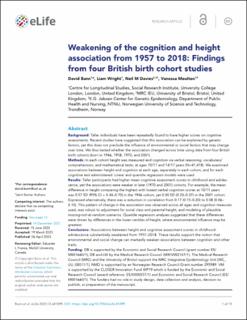| dc.description.abstract | Background:
Taller individuals have been repeatedly found to have higher scores on cognitive assessments. Recent studies have suggested that this association can be explained by genetic factors, yet this does not preclude the influence of environmental or social factors that may change over time. We thus tested whether the association changed across time using data from four British birth cohorts (born in 1946, 1958, 1970, and 2001).
Methods:
In each cohort height was measured and cognition via verbal reasoning, vocabulary/comprehension, and mathematical tests; at ages 10/11 and 14/17 years (N=41,418). We examined associations between height and cognition at each age, separately in each cohort, and for each cognitive test administered. Linear and quantile regression models were used.
Results:
Taller participants had higher mean cognitive assessment scores in childhood and adolescence, yet the associations were weaker in later (1970 and 2001) cohorts. For example, the mean difference in height comparing the highest with lowest verbal cognition scores at 10/11 years was 0.57 SD (95% CI = 0.44–0.70) in the 1946 cohort, yet 0.30 SD (0.23–0.37) in the 2001 cohort. Expressed alternatively, there was a reduction in correlation from 0.17 (0.15–0.20) to 0.08 (0.06–0.10). This pattern of change in the association was observed across all ages and cognition measures used, was robust to adjustment for social class and parental height, and modeling of plausible missing-not-at-random scenarios. Quantile regression analyses suggested that these differences were driven by differences in the lower centiles of height, where environmental influence may be greatest.
Conclusions:
Associations between height and cognitive assessment scores in childhood-adolescence substantially weakened from 1957–2018. These results support the notion that environmental and social change can markedly weaken associations between cognition and other traits. | en_US |

